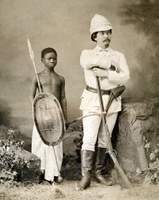Aid is dead. Long live aid.

Dambisa Moyo was born and raised in Zambia. She has a PhD in Economics from the Oxford University, a Masters from Harvard and an MBA in Finance from the American University in Washington DC.
She previously worked for the Worldbank, and in debt capital markets at Goldman Sachs. (Full)
 Just to illustrate she is not "just anyone" when one considers the insights registered in her book "Dead Aid", subtitled "Why aid is not working and how there is another way for Africa".
Just to illustrate she is not "just anyone" when one considers the insights registered in her book "Dead Aid", subtitled "Why aid is not working and how there is another way for Africa".
From her website:
In the past fifty years, more than $1 trillion in development-related aid has been transferred from rich countries to Africa. Has this assistance improved the lives of Africans? No. In fact, across the continent, the recipients of this aid are not better off as a result of it, but worse—much worse.
In Dead Aid, Dambisa Moyo describes the state of postwar development policy in Africa today and unflinchingly confronts one of the greatest myths of our time: that billions of dollars in aid sent from wealthy countries to developing African nations has helped to reduce poverty and increase growth.
In fact, poverty levels continue to escalate and growth rates have steadily declined—and millions continue to suffer. Provocatively drawing a sharp contrast between African countries that have rejected the aid route and prospered and others that have become aid-dependent and seen poverty increase, Moyo illuminates the way in which overreliance on aid has trapped developing nations in a vicious circle of aid dependency, corruption, market distortion, and further poverty, leaving them with nothing but the “need” for more aid.
Debunking the current model of international aid promoted by both Hollywood celebrities and policy makers, Moyo offers a bold new road map for financing development of the world’s poorest countries that guarantees economic growth and a significant decline in poverty—without reliance on foreign aid or aid-related assistance.
Dead Aid is an unsettling yet optimistic work, a powerful challenge to the assumptions and arguments that support a profoundly misguided development policy in Africa. And it is a clarion call to a new, more hopeful vision of how to address the desperate poverty that plagues millions.
There are a series of interesting articles covering her book and her opinions:
- The Anti-Bono (NY Times)
- Aid dependency blights Africa. The cure is in the credit crisis. (Independent)
- The road to ruin (Guardian)
- Everybody knows it does not work (Guardian)
More here.
Of course the aid "industry" has reacted. But barely. As of today, a Google search only shows two articles: A half-assed reply by the co-founder of "One" in the Financial Times, and a more relativating answer by the CEO of SOS Children UK.
Update: Feb 23: Another half assed answer by Oxfam
Dambisa clarifies in one article:
She makes it clear at the outset what kind of aid she means. She does not mean humanitarian or emergency aid, mobilised in response to calamities; she does not mean charity-based aid, given to specific organisations and people on the ground, in order to achieve specific things (she sits on the boards of several charities, one of which distributes antiretrovirals); she is hopeful about a new attitude to food aid, whereby the money is used to buy food from farmers within a country, and then distribute it to those in need, instead of flooding the place with foreign food that undercuts local growers. What she means is "systemic aid", the vast sums regularly transferred from government to government, or via institutions such as the World Bank. (Full)
My response, as an aid worker, is this:
1. Don't limit the discussion
If one limits the discussion only to aid given to a government (bilateral or via IMF/Worldbank), we are limiting the discussion too much. We do need to question any form of aid. Even though aid given to government institutions is an obvious (and easy) target of criticism.
But also humanitarian aid, emergency aid, should be looked at. Why, after decennia of foreign aid, is the West still crawling over each other to provide relief in cases of natural disasters? What is done to institutionally ensure these countries (which are always the same, by the way), can (mostly) take care of their own disaster response?
2. Aid has proven to be ineffective.
It is clear that traditional aid does not work. And has never worked. Otherwise aid organisations would have been able to prove at least some progress in countries like Somalia, Ethiopia, DRC, Afghanistan,...
If it took us 40-50 years to come to that conclusion, so be it. A pity of the money wasted, but at least let's start changing the mechanics now.
 3. But everybody was happy?!
3. But everybody was happy?!Aid has been a self-fulfilling and self-fueling economic mechanism. I have always said there are three markets in the world economy: the official market, the black market and the aid market.
All three keep the world economy turning. Unfortunately mostly the "first world economy". Here is how I see it work:
- Too many donor governments are all too happy to channel foreign aid through whatever means. After all, they need to look good on the Millennium Development Goals (MDG) performance scale. And it is good for public opinion. Helps get people re-elected.
- Too many aid organisations are all too happy to transform that donor money into projects. After all, they need to sustain themselves. No, or hardly ANY aid agency will turn down money from a donor. No matter how ridiculous or un-needed the targets are (hats off to MSF for refusing more Tsunami aid two weeks after the disaster, stating they had sufficient funding. Which aid agency would have the courage to do that?)
- So one loves to give, the other loves to accept. All happy-happy.
- Foreign "aid" as such is an industry by itself. It employs people, it keeps "the economy" running. But whose economy?
No surprise a lot, if not most, of the goods procured by aid organisations is produced in "the West". Many services are procured from companies in "the West". In this aspect, not much difference between "a war in Iraq" and "foreign aid", is there? Both are wagging the dog of 'our economy'.
- Foreign "aid" has been targeting mostly countries a donor country had a political, economical or military connection with. "Aid" was just a way of keeping government counterparts happy. No matter if the aid was effective or not. It kept the targeted country as an ally. We got cheap resources from them, or they did not 'fall' into the hands of the communists, or more recently in the hands of the islamists.
4. The worst was if aid would actually work
For the 'west', it has always been best if a developing country sitting on a lot of natural resources (oil, diamonds, gold, minerals) was unstable.
It was a way to get those resources cheaply. During the Angola civil war, their oil was sold for many years in advance, only to keep the cost of war going.
Look around you: which countries have gone through the most devastating levels of poverty and civil war? Liberia, Sierra Leone, Angola, DRC, Somalia, Sudan... I bet you if we make a top 10 list of the countries (in the world) with the longest civil wars, and you tick those with abundant natural resources, you would be surprised of the correlation.
OK, I will relativate: natural resources or a country's strategic (political, religious or geographical) position.. Should cover all on the top 10, top 20 list.
So if aid would have been effective, and would have brought peace, prosperity or stability, in what way would it not have been decremental to the Western Economy? God forgive if a country like that would become an economical power. An independent political entity with its own mind. Gosh, think what that would have done to the political position of the powers-that-be?
 5. So what is the way out?
5. So what is the way out?- I agree with Dambisa: government to government aid does not work. As electorate, we should hold our governments accountable to give us real and verifiable figures of effectiveness.
- Worldbank aid does not work. Same thing: Show us verifiable figures of effectiveness.
- Effectiveness of aid in no matter what shape or form, should be measurable along the same criteria. Criteria should include clear and concrete targets from the onset, and measures of achievement. Aid should measured by the effectiveness for the individuals targeted, not by the effectiveness for institutions (which can not be measured).
- Any aid organisation, any humanitarian organisation should work on a voluntary funding basis. No guaranteed annual funding. Funding per project. You don't perform? Next time you don't get funding anymore. Worldbank the first to start.
- Aid, any aid, should be audited by external bodies. Objective figures should be provided for overhead.
- Aid, any aid, should be governed by the same measures of governance quality as the commercial market (as long as it is not the US-standards of governance. We all saw where that one brought us).
Why don't we apply ISO-9002 to aid? Let's make an ISO standard for aid. After all we spent trillions on aid. And it our money. Us, tax payers, need to know. We cry foul when we see the government wasting money on ineffective road building or useless prestige projects, but don't cry foul when we pour billions over the 'poor'? Because we get soft hearted when seeing children crying on TV? Think what you do to that child to ensure it stops crying the next year. And the year after. And the year after.
OkayOkayOkay. I am getting off my soapbox now.
Pictures courtesy deadaid.org, AP, princeton.edu and Logan Abassi (MINUSTAH)
 Peter. Flemish, European, aid worker, expeditioner, sailor, traveller, husband, father, friend, nutcase. Not necessarily in that order.
Peter. Flemish, European, aid worker, expeditioner, sailor, traveller, husband, father, friend, nutcase. Not necessarily in that order.
3 comments:
Just two quick points.
The emergency sector does have a standard like the ISO it is the HAP Standard see http://www.hapinternational.org/ this organization has many leading INGOs as members.
Secondly not having guarenteed funding is part of the problem for NGOs beucase they cannot be strategic in their approach and build sufficient capacity to egnage with long term issues if they have cycles of boom and bust around project acquisition. NGOs shoudl be accountable, but should also be equipped well to do the job.
I agree with most of this- but I am still unsure how you can conclude that aid has not worked. We have no benchmark to measure it against- we only have one world, one reality. Who's to say what state Somalia, DRC etc. would be in *without* aid?
@Rosiroo,
- we need to differentiate what kind of aid. See my point 5. Humanitarian aid (as in the case of Somalia and DRC) has worked (up to a point), otherwise more people would have died. But did it work well.
- And indeed, my point 5, also calls on the benchmarks on how to measure the effectiveness on aid. Which do not exist at the moment. (apart from the generic HAP standards, which are a start)...
Peter
Post a Comment